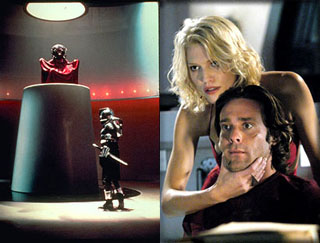
I definitely like the new Cylons better than the old ones, although I wonder where the big lizard-head guy went.
Please forgive me as I geek out a little here, but… People are saying that Battlestar Galactica‘s plot is starting to show evidence of lacking any real long-term plan or direction. That is, they fear that that the creators don’t have an “endgame” in mind for for the humans and the Cylons; indeed they may even be making it up as they go along, episode to episode, not having any ultimate fate in mind whatsoever.
Most people who have watched a TV series with a long-term story arc, particularly one in the genre of “speculative fiction” (the same-acronym-but-new-name for the despised sci-fi/fantasy genre), beleives that the best stories need to posess an integral “mystery to the universe”. And that mystery must, inevitably, be fully resolved in some climactic revelation — peace between enemies, a new frontier revealed, the birth of the savior, the defeat of the demon, the union of the lovers, the puzzle solved.
This resolution, of course, is almost never fulfilled. When a dramatic series with a expansive plot arc is given the pink slip, the producers will generally slap together a set of “final chapter” episodes to make a last ditch effort to wrap things up. The endgame is usually something totally unexpected and abrupt in the context of the larger story arc (“look, a wormhole home!”). The list of lame dramatic series conclusions is packed: X-Files, Carnivale, Twin Peaks. Even the original Battlestar Galactica fizzled out with the real Wolfman Jack taking a Cylon to a Terran disco.
In fact, the only times when a series has wrapped up its larger story arc with any sort of grace is when the series was always intended to have a finite plot: Or, as Aristotle would say, a story with a beginning, middle, and end. Examples range from I, Claudius to Brideshead Revisited. Note that both are BBC mini-series, and neither are even remotely “speculative fiction”.
But Galactica fans crave a purpose, a meaning to their universe. And they fear that recent episodes, exploring the romantic and professional relationships between the characters, portend future plot doldrums. They fear that the “big arc” revelations and plot twists, which used to come down like a perpetual avalanche, are going to be invented without a final ending in mind, and that therefore the events will be less meaningful.
Ultimately, I think this fear is unwarranted. There’s no rule that says that serial fiction needs to have an ultimate ending in mind. Even novelists don’t always work that way: Dickens changed his plots based on the public’s reactions to each published chapter of his serial novels (“Make ’em laugh, make ’em cry, make ’em wait!”). A neatly-wrapped up ending to a finite story arc is a perfectly fine thing, but it is for plays, movies, novels, and the television mini-series. True serial television, however, is a fundamentally different art form, and I admire that the Galactica team has taken the challenge of keeping the tension and anticipation levels high while ultimately aiming at an unknown plot horizon.
Ironically, a central theme of the show is that the Cylons believe in an underlying meaning to the universe, whereas the humans are nihilistic and live only to protect themselves to live another day. This says to me, implicitly, that nihilism is good and fatalistic determinism is bad.
They could, of course, end it all with a quasi-scientific explanation of what the Cylons really want, and why. That would be incredibly lame, like Lucas’s stupid midichlorians. But I have faith that the Battlestar people are above this easy way out. Exhibit A is the religious adherence to lo-tech. B is Olmos’s vow that he’d quit the show if ever a prosthetic-foreheaded actor dares to step on the set. (Ron Moore, the series creator, has a blog, by the way, which reveals a lot about how he thinks.)
On the other hand, if the series were actually to reveal a hidden mystical purpose to the universe, it would cheapen the struggle the humans have been making against the Cylons. It would be like letting the Cylons win. Which, of course, would be frakking awesome way to end the series.
Comments
2 responses to “Battlestar Erratica”
Hi Chris —
One of the obvious reasons why BSG resonates so much with people is because it mirrors current events.
I think primarily the reason why people are craving this “climactic revalation” in BSG is because they crave this sort of “ultimate resolution” in real life. There is so much uncertainty in the world that perhaps unconsciously they want to find the answers to real-life mysteries within the stories of what is an exceedingly topical television entertainment (much like 24).
I think you’re right – BSG doesn’t need any pat or easy plot resolutions; to keep capturing the viewer’s attention, it needs to meander and keep reflecting the events, dialogue, and mood of the day.
Nam, that’s an excellent point. Maybe some people seek closure in their stories, and others simply do not. I think Aristotle had a term for this, too: catharsis.
Anyway, if it’s any consolation, it looks like after 4 episodes in a row of not advancing the main plot arc and dwelling on the soap opera aspects of the show (which, by the way, I enjoy just as much as the fate-of-the-universe storyline), they’ve finally gotten back into the truly heavy earth-shattering stuff. The recent episode told from the Cylons’ point of view was the best one yet.